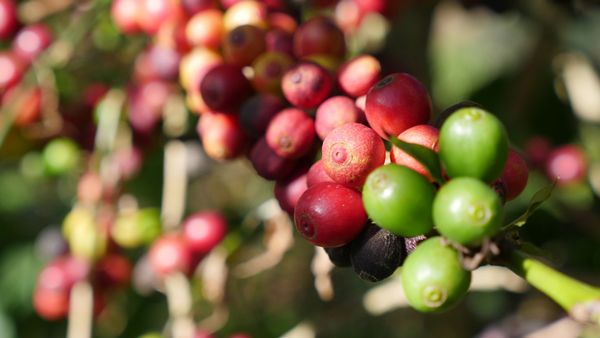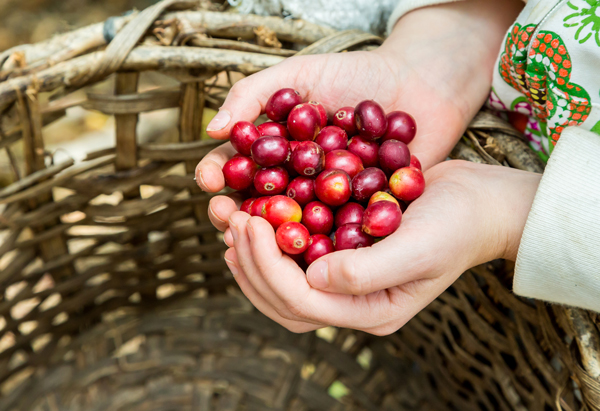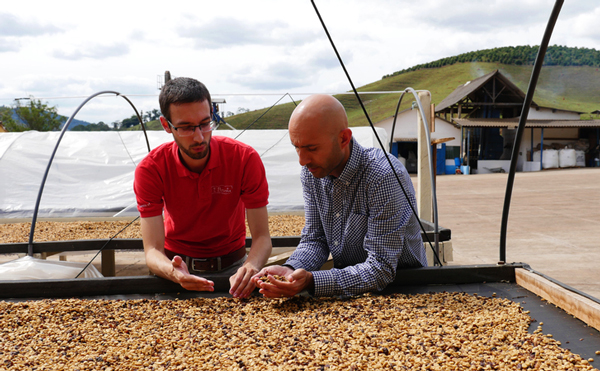Treat yourself to the best coffee
and why L’Amante coffee truly ranks among the very best
https://www.bonvinitas.com/media/reviews/photos/thumbnail/780x480c/42/c9/05/treat-yourself-to-the-best-coffee-100-1752392722.jpgOnly ripe coffee cherries hand-picked
 Coffee cherries at different stages of ripeness on the plant
Coffee cherries at different stages of ripeness on the plant
 At L'Amante, only such ripe coffee cherries are hand-picked. Photo: Robert Leßmann - Adobestock
At L'Amante, only such ripe coffee cherries are hand-picked. Photo: Robert Leßmann - Adobestock
Drying in raised beds and strict sorting
Before the coffee beans are subjected to strict sorting, they must be dried. “We rely on raised beds. This not only prevents contamination from pebbles and such, but also ensures a gentler drying process and helps prevent mold formation,” explains Schober.
 Drying in advantageous raised beds
Drying in advantageous raised beds
 Best coffee before roasting. Photo: contrastwerkstatt - Adobestock
Best coffee before roasting. Photo: contrastwerkstatt - Adobestock
Longer roasting and gentle cooling
 Photo: Sönke Hayen - Adobestock
Another essential factor of quality is roasting. The right roasting is needed to unlock coffee’s especially enticing aroma. With up to 800 aromatic compounds, coffee has great flavor potential. These must be activated. That’s why L’Amante roasts the green beans depending on variety in a drum roaster for 15 to 22 minutes at around 220 °C — significantly longer and gentler than is common in the industry. This enhances both aroma development and the breakdown of bitter substances and chlorogenic acids. After roasting, the beans are not cooled by a machine process but slowly and gently air-cooled, which also supports quality. As a result, L’Amante coffees offer an especially rich aroma and flavor profile. Moreover, longer roasting improves digestibility.
Photo: Sönke Hayen - Adobestock
Another essential factor of quality is roasting. The right roasting is needed to unlock coffee’s especially enticing aroma. With up to 800 aromatic compounds, coffee has great flavor potential. These must be activated. That’s why L’Amante roasts the green beans depending on variety in a drum roaster for 15 to 22 minutes at around 220 °C — significantly longer and gentler than is common in the industry. This enhances both aroma development and the breakdown of bitter substances and chlorogenic acids. After roasting, the beans are not cooled by a machine process but slowly and gently air-cooled, which also supports quality. As a result, L’Amante coffees offer an especially rich aroma and flavor profile. Moreover, longer roasting improves digestibility.
Just as important: the right blend
 Photo: yuriyzhuravov - Adobestock
As with all plants, there are many species and subspecies of coffee. Each Arabica or Robusta variety has its own special flavor characteristics, ranging from delicately mild to refreshingly fruity or boldly spicy. “To find exactly the right combinations, we take a lot of time to develop coffee blends. We only release a new variety once it has undergone a thorough selection process — including tastings with coffee experts, blind tastings, or competitions,” says Schober.
Photo: yuriyzhuravov - Adobestock
As with all plants, there are many species and subspecies of coffee. Each Arabica or Robusta variety has its own special flavor characteristics, ranging from delicately mild to refreshingly fruity or boldly spicy. “To find exactly the right combinations, we take a lot of time to develop coffee blends. We only release a new variety once it has undergone a thorough selection process — including tastings with coffee experts, blind tastings, or competitions,” says Schober.
To ensure this, L’Amante has its coffee assessed by so-called Q Graders. Q Graders are experts certified through a complex and globally standardized testing process by the internationally respected Coffee Quality Institute (CQI). They evaluate coffee according to uniform global standards using various taste and aroma tests — focusing especially on aroma, acidity, fragrance, and flavor.
By the way, L’Amante is an Austrian company based in Graz, founded in 2012, with several branches including a German one in Munich.
Link to order from the L’Amante shop: https://www.lamante.com/?ref=20054780
Text: Dieter Simon, Publisher and Editor-in-Chief of bonvinitas. Photos: L’Amante PR unless otherwise noted.





